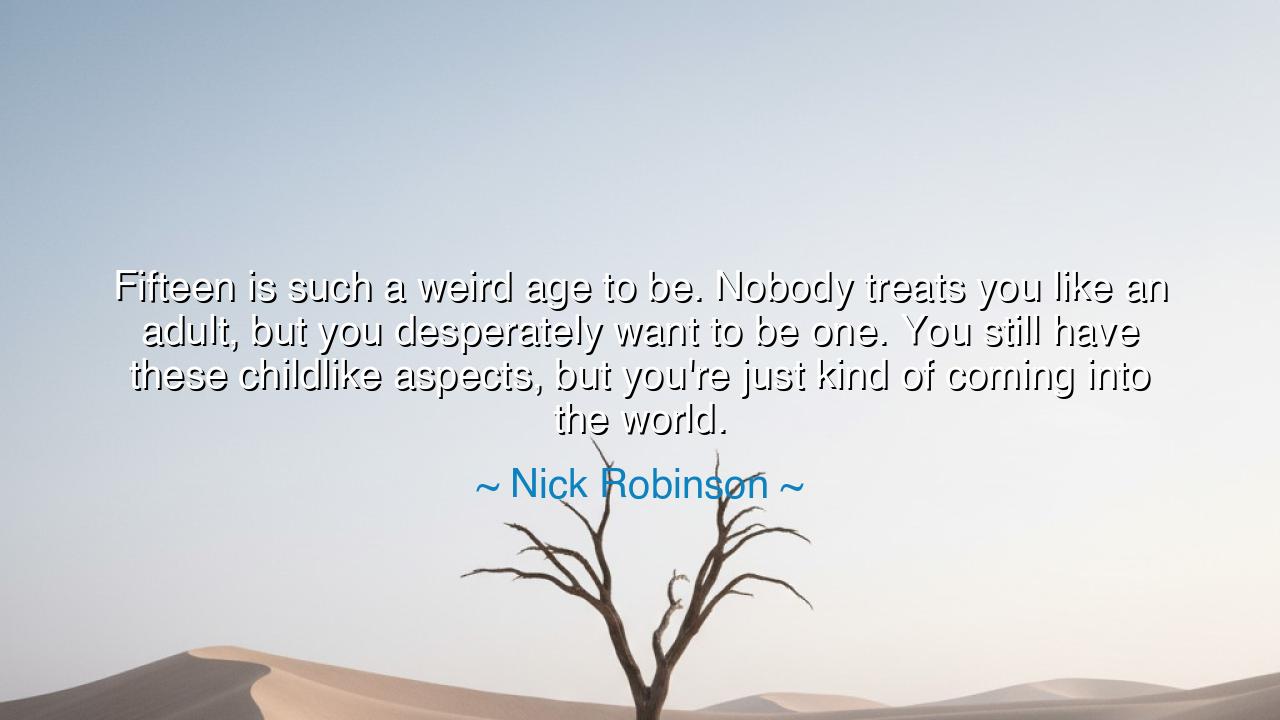
Fifteen is such a weird age to be. Nobody treats you like an
Fifteen is such a weird age to be. Nobody treats you like an adult, but you desperately want to be one. You still have these childlike aspects, but you're just kind of coming into the world.






"Fifteen is such a weird age to be. Nobody treats you like an adult, but you desperately want to be one. You still have these childlike aspects, but you're just kind of coming into the world." These words, spoken by the actor Nick Robinson, capture the strange tension of adolescence, a time when one stands between two worlds—the innocence of childhood and the responsibility of adulthood. At the age of fifteen, the individual is neither fully a child nor fully an adult, but exists in a space of liminality, where the mind and spirit are pulled in two opposing directions. This age is marked by a deep desire for independence, yet it is also filled with the weight of unresolved uncertainty and the yearning to find one's place in the world.
Fifteen is a time when the old boundaries of childhood begin to blur, yet society still treats the individual as a child. The world is filled with expectations that one should act mature and take on adult responsibilities, but society’s treatment of the fifteen-year-old does not align with those expectations. The young person feels the urge to step into the realm of adulthood, yet is often denied the recognition of having done so. The world may see them as immature, but inside, they are filled with the turbulent thoughts and ambitions of someone ready to take on the world. This internal conflict—between who one is expected to be and who one desires to become—is the very essence of the fifteen-year-old experience.
Consider the life of Alexander the Great, who, at the age of twenty, took the reins of an empire that stretched from Greece to India. But long before that, as a teenager, he had already begun to show the boldness and leadership that would define him. In his early years, he was torn between the childlike joy of youth and the pressing duties of becoming a ruler. He had the wisdom of experience around him, yet he was not yet recognized as the fully-fledged ruler he yearned to be. His journey, though, was not easy. It required an internal struggle, a fight between his desire to remain a boy and the expectation placed on him to mature into the king he would eventually become.
The young warrior's journey was filled with confusion and the desire to break free from the constraints of childhood—a similar sentiment that Nick Robinson’s words bring to light. The fifteen-year-old often faces conflicting forces: the desire to be more, to be treated with respect, and to take on the weight of the world, while still carrying the emotional vulnerability and childish traits that are part of their foundation. This coming-of-age stage is often a battle between freedom and responsibility, independence and dependence, and the quiet yet urgent need to be seen as an adult while still navigating the complexities of adolescence.
However, this age is also a time of great growth. The fifteen-year-old is on the brink of self-discovery, standing at the threshold of adulthood with an endless array of opportunities ahead. It is a time when one begins to carve their own path, to dream, and to aspire. Yet, as Robinson so poignantly describes, it is also a time when the individual is still learning, still in the process of defining who they are, and still exploring the vast world around them. The childlike aspects are not to be cast aside, for they are the foundation upon which the adult will one day stand. They are essential to the wisdom that comes with experience.
The lesson here is clear: fifteen is a time of transition, a time when the seeds of adult wisdom are planted, but are not yet fully realized. The fifteen-year-old is an individual in flux, experiencing the tension between the past and the future. It is a time to honor both the child and the adult within, understanding that growth comes not from the denial of one’s youth, but from the embracing of it. To the fifteen-year-old, this moment may feel frustrating and confusing, but it is also a crucible—a stage where one's character is forged and one's understanding of the world begins to take shape.
As we reflect upon this, we must understand that growth is a process, and no one becomes an adult simply by wishing it. Just as Alexander had to prove himself on the battlefield and work toward the leadership that history would remember, so too must we work toward maturity, balancing the child within with the demands of the world. The practical action here is to embrace this age of transition. Cherish the moments of childlike wonder, but also pursue the responsibilities that come with growing older. Know that each challenge faced and each decision made is part of the journey toward the full realization of your potential.
In conclusion, Nick Robinson’s words speak to the universal struggle that each young person faces at fifteen: the desire to be treated as an adult, while still navigating the complexities of adolescence. It is a journey of self-discovery and growth, filled with both tension and possibility. May we all remember that the path to maturity is not a single step, but a process—a process that requires patience, understanding, and the acceptance of both our youthful energy and the responsibilities that come with adulthood.






AAdministratorAdministrator
Welcome, honored guests. Please leave a comment, we will respond soon